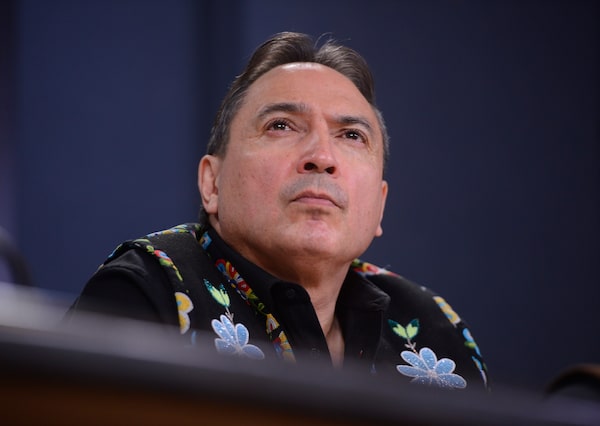
Assembly of First Nations National Chief Perry Bellegarde at the National Press Theatre in Ottawa on Feb. 18, 2020.Sean Kilpatrick/The Canadian Press
Canada must invest in closing the gap for Indigenous people as it emerges from the COVID-19 pandemic, the outgoing head of the Assembly of First Nations said Tuesday.
“That gap amplifies every threat and every harm from this pandemic, from the risk of infection to the stress of lockdown,” National Chief Perry Bellegarde said in remarks to the virtual general assembly of the national political advocacy organization he has led since 2014.
“It is a rift that is both deep and wide. And it’s been carved by decades and centuries of racism, discrimination and indifference.”
It also denies Indigenous People access to quality health care and forces families to live in overcrowded and unhealthy homes, he added, which is one way the COVID-19 pandemic risks making the socio-economic inequity for First Nations worse than before.
Bellegarde also said reconciliation will not happen without a transformational change to keep Indigenous people safe, guarantee a better future for their children and protect the environment.
“We must try to replace fear and distrust with a common purpose to build a better, stronger, and more resilient and a more tolerant Canada,” he said.
Prime Minister Justin Trudeau told the chiefs that he understands their concerns that the COVID-19 pandemic exacerbates the already dire circumstances in which too many First Nations people live.
“I hear you when you say that the status quo isn’t good enough,” Trudeau said.
“If this pandemic has taught us anything, it’s that there is much more to be done.”
Trudeau renewed his commitment to lift all long-standing boil-water advisories without providing a specific date.
He took questions from the chiefs about housing, health care and the safety of Indigenous communities during the pandemic, and said he’d pass most of them on to Indigenous Services Minister Marc Miller and Crown-Indigenous Relations Minister Carolyn Bennett.
He was also asked about gaps in funding programs. He said the issue needs to be addressed by working with Indigenous communities because they know best how to connect the streams of money in the right way.
“These are all things that we need to work on together and folks in Ottawa don’t always know how they best fit together,” Trudeau said.
“You are best positioned to, to know and say exactly what the plan is to fit everything together and set your community on the right path for the long term.”
Bellegarde, who announced Monday he is not seeking re-election next year, said he wants to focus on advocating for Indigenous people at this critical time.
“Our team at the AFN will continue to advocate for access to the resources or communities that they all need to manage this crisis,” he said.
The election to name a new national chief will be held virtually in Toronto next July.
During this week’s virtual assembly, the AFN is planning to urge the federal Liberal government to do more to deal with the disproportionate impact the COVID-19 pandemic is having on Indigenous communities.
Chiefs are also set to discuss, among other things, whether they will support legislation the Liberal government introduced this week that would ensure Canadian law is in harmony with the United Nations Declaration on the Rights of Indigenous Peoples.
Ontario Regional Chief RoseAnne Archibald said the pandemic has hit First Nations communities hard, but they have also long dealt with inequitable treatment in Canada.
She said Canada has an opportunity to take big steps towards improving the situation through programs, services and funding as the country rebuilds its economy.
“Chronic underfunding of First Nations is very evident when you look at First Nations health status right now and why we have such high rates of COVID-19,” she said.
The AFN meeting was originally scheduled to take place in Halifax this summer but was put off due to COVID-19.
Yukon Regional Chief Kluane Adamek said some Indigenous communities don’t have broadband internet and they will have to call in by phone to participate in the meeting.
“This is the first time we’re doing this, so there’s no doubt that there’s going to be some challenges and glitches,” she said.
She said one resolution calls for an end to gender-based discrimination within the AFN, which represents more than 600 First Nations in Canada, to help the group lead the way in advancing gender equity.
The organization is expected to create a First Nations veterans’ council to promote the recognition of contributions of Indigenous military and RCMP veterans in Canada through education and to develop and maintain a database of First Nations veterans.
Our Morning Update and Evening Update newsletters are written by Globe editors, giving you a concise summary of the day’s most important headlines. Sign up today.